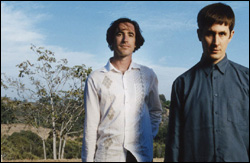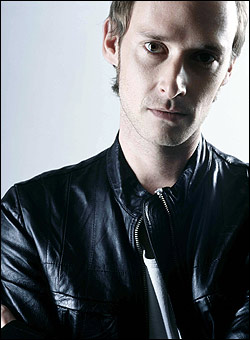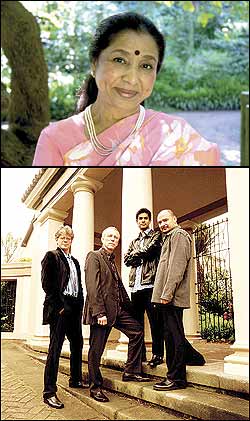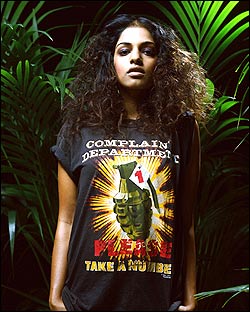The Mountain Goats began in 1991, when John Darnielle—then a registered nurse living in California—began recording his enormously literate songs (which frequently mentioned early-’80s Brit fops Spandau Ballet, for some reason) onto a fuzzy boombox. Collected into a steady stream of cassette-only releases before Darnielle made the jump to compact disc in 1995, the lo-fi recordings won a devoted following; by the time Darnielle signed with 4AD two years ago, he’d become an indie-rock semistar, thanks also in part to his terrific ‘zine, Last Plane to Jakarta, which is online at www.lastplanetojakarta.com. His 4AD debut, 2002’s Tallahassee, recorded cleanly in the studio and featuring some of the best songs he’d ever written, put Darnielle further in the public eye, and the new We Shall All Be Healed, recorded at Bear Creek Studios in Woodinville with producer John Vanderslice, is just as good. Darnielle has said the new album’s lyrics are more personal than is usual for him, and Healed‘s landscape of fragmented friendships and speed-freak paranoia documents an urban bohemia reminiscent of the Beats without resorting to mere mimicry. The Jukebox took place backstage before a March show at New York’s Knitting Factory.
R. Kelly: “Ignition Remix” (2003) from Chocolate Factory (Jive)
John Darnielle: Please! Best song of the past 10 years! [sings along and starts mock-grinding with Kimya Dawson, who is standing nearby, looking bemused] I think it’s better than anything the Beatles ever did. Period. Although this is emblematic of what R. Kelly does. He has a lot of songs that are close to that good. That just sounds like the most free and loose one; he managed to make it sound like nobody was even trying, like they just happened across that sound. It’s clear that everyone involved is tweaking everything, micromanaging the sound. But he winds up sounding like he just stepped in, had an idea, and just started saying what was in his head. Which is the whole idea behind a good party record.
Seattle Weekly: Do you like the rest of that album?
Darnielle: Yeah. Like most R. Kelly albums, it’s about three-quarters good. “Snake” is really good, the “Step in the Name of Love Remix” is gorgeous. It’s just really lush and great, so yeah. I like a lot of stuff on that album.
John Vanderslice: “Pale Horse” (2004) from Cellar Door (Barsuk)
Darnielle: It’s the first one on the new Vanderslice. I’m pretty sure the lyrics are a poem by Percy Bysshe Shelley. Which is funny because I didn’t know that, and I criticized John for rhyming “life” with “strife,” which I consider to be a really bad rhyme. And he said it’s Shelley, and I said, well, that’s OK, most English majors like me don’t consider Shelley all that much.
SW: Can you talk a little bit about working with John Vanderslice?
Darnielle: As I’ve said often, he’s a cruel and sadistic man, and he gets the results he gets from the bands he records by physically abusing them, night and day, running us on two hours of sleep a night, and kicking us frequently in the eye and in the small of our backs. Nah. As is widely known, John is the nicest guy in the whole industry. The way he works in the studio is the way he works elsewhere; he just sort of makes room for you to do what you meant to do. Yeah, he and his engineer Scott are inseparable. They work beautifully together.
SW: What made you decide you wanted to work with him?
Darnielle: The sound of Time Travel Is Lonely, especially the acoustic guitar sounds he got. I really wanted somebody who could get a live, crackling acoustic guitar that doesn’t sound like it’s window dressing, who could understand that the acoustic guitar could be a very violent thing. I thought he had a great ear, and I knew he liked my stuff. And I thought the new songs were the best ones I’d ever written, so I wanted someone who was doing what I was doing.
SW: The orchestration on We Shall All Be Healed is certainly a lot different from your previous records. Some purists are like, this isn’t a Mountain Goats record—what’s with the tinkling piano and that sort of thing?
Darnielle: The whole point of the Mountain Goats has always been the lyrics. The main reason there’s been minimal orchestration has been so there wouldn’t be anything to distract from what I think the whole point is. I think anybody who doesn’t think my new lyrics are the best ones I’ve ever written either likes the old ones for the wrong reasons, or hasn’t listened to the new ones well enough. I can say that as an English major guy, that this is my best work, from a number of objective standpoints. There’s nothing you can do about those people; they were looking for something to be mad about. So I guess I gave them their Christmas present.
Danger Mouse: “Justify My Thug” (2004) from The Grey Album (bootleg)
Darnielle: This is a pretty indie-sounding Jay-Z! This isn’t with Panjabi MC, is it? Where’s it from? I haven’t heard the new record. Oh, this is off that Grey Album, right? I have this in the car, but I haven’t made it past the first track or two.
SW: It’s “Justify My Thug” backed by “Rocky Raccoon.”
Darnielle: Those are two albums I haven’t heard in a long time. I think he could have used a more interesting source text than the White Album to bounce Jay-Z off of. I mean, Beatles records, of course they’re great records. But on the other hand, how uninteresting they are—they’re not really records, they’re cultural texts. They’re almost impossible to approach as records. I think that’s maybe what the guy’s trying to do there a little bit, but I’d be more interested to see what he’d have to do with the Troggs and Jay-Z. That might have been an interesting point of comparison. Somebody gave it to me. I made it through about two tracks and was like, OK, I see the point I guess, but I couldn’t get as excited about it as everybody else is.
SW: Do you see any Mountain Goats mash-ups happening?
Darnielle: I wouldn’t be the one doing them, but anyone is welcome to mash me up as much as they like.
SW: Tell me a little more about the idea of albums as cultural texts.
Darnielle: I’m writing a book about that very question right now—can you separate Led Zeppelin from their cultural-wallpaper trappings and just hear the music? I think with Led Zep you can, but I think it’s almost impossible to listen to a Beatles record and just hear the record. It’s almost completely impossible. You can do it about as easily as [you can] read the Gospels as though you’ve never read them before. I can’t tell you a whole lot more about the book because I’m still working on the proposal. It’s called Learning to Live With Led Zeppelin. It intends to try to examine the various cultural things that Led Zeppelin has come to represent, and what the words Led Zeppelin mean as meme and as generally understood cultural texts. The heart of it will be close readings of the actual albums.
SW: I didn’t know you were a big Led Zeppelin fan.
Darnielle: I wasn’t. Ever. I’m more interested in the fact that since I managed to almost completely ignore them, when I actually sat down with an album, I managed to come at it with fresh ears. And if you’re able to do that, you hear some pretty remarkable records.
The Fall: “Hip Priest” (1982) from Hex Enduction Hour (Kamera)
Darnielle: It’s the Fall! Didn’t recognize it ’til the voice came in. But is there any song in the history of indie music that’s been more sung by people while wandering around their houses by themselves, with no music playing? “Hip Priest-uh!”
SW: I know you really like the Fall . . .
Darnielle: I can’t fairly describe myself as a big fan. I like them a lot, but I’ve personally always been satisfied with just a little Fall around the house. I don’t go, “Ooh! I have to get that Fall record!” Except for This Nation’s Saving Grace. I did get an obsession about that at one point.
SW: Did Mark E. Smith’s songwriting ever have any impact on you?
Darnielle: I hated them when I was in high school. I thought they were awful. So I actually didn’t start listening to the Fall until a couple years ago. I can’t make out what he sings most of the time. The point of the Fall is more like an iterative thing. They were trying to be the only band that sounded like that. So anybody else who sounds like that is going to sound like them. When I was in high school, they were on this Factory sampler—this video of Factory bands. We had no idea of what they were doing. It looked like they were having too much fun. I was a little goth boy. I wanted bands to be very serious. The song was “Totally Wired,” and I did not like it. I’m sorry to say that, because now I think it’s a wonderful song.
Stockholm Monsters: “Decalogue” (1984) from Alma Mater (Factory)
Darnielle: [immediately] Stockholm Monsters! I always get the titles wrong, but it goes like [adopts serious British accent] “Try to realize, all the time, but when I do, I just get nowhere.” Is it “Decalogue”?
SW: Yes.
Darnielle: I’m thinking of covering that song. Every song on that record was pure gold. This record changed my life. Largely because I was 16 and ready for some record that we’d bought on chance, my girlfriend and I, to settle into the summer and sort of define it. But there’s something about this that’s so much better than anything else that happened on Factory Records. It’s that you could believe that this band doesn’t care if you’re listening to them or not. You know when you listen to Joy Division that they expected you to listen and be bowled over. And you know when you listened to the Durutti Column that they expected you to be wowed in some way, or to have some particular feeling. But I would believe this band if they said, “We’re just playing to play.” It’s so lacking in any ambition outside of itself. And then the fact that it’s so sad. It seems like what they wanted to do for no particular reason was express this sadness. Not depression, not anger, just sadness.
SW: Why do you think they never got as big as the other bands on Factory?
Darnielle: Well, I think they happened along Factory at a time when the money was getting a little weird, and the appeal was limited for them, and they were sent on some weird places to tour; they wound up doing television in Guam or the Falklands or something like that. They never came to the U.S. They didn’t tour a whole lot. And apparently they weren’t pleasant people to hang out with a lot of the time, like a lot of Factory bands were. There’s not a lot of ready appeal to the Stockholm Monsters. That said, I don’t understand why everybody doesn’t love them more than anything in the world.
Entombed: “Premature Autopsy” (1990) from Left Hand Path (Earache)
Darnielle: Morbid Angel? Cannibal Corpse? Deicide? Vital Remains?
SW: You’re getting closer.
Darnielle: Exhumed? No, Entombed!
SW: Yes.
Darnielle: This is Entombed, really? Wow, they used to sound a lot poppier than that. My main thing is American death metal from South Florida, and North American death metal from Quebec, which is like the hotbed of death metal, which I find exciting, that musical styles pick these random places to become prevalent. I don’t know what to say about it except that I like it because it’s sui generis—it’s its own thing, unbelievably committed to its own craft. I have some punk-rock romance about people who I believe are not doing stuff to make money, you know. When Glenn Benton of Deicide branded an upside-down crucifix on his forehead, that was kind of a cool statement, kind of like saying, “I don’t care if I never get a day job, I’m just gonna play death metal.” I’ve gotta respect that. And Trey Azagthoth of Morbid Angel’s desire to play the most from-space guitar leads in the whole history of the world. That’s dedication.
Spandau Ballet: “Gold” (1983) from True (Chrysalis)
Darnielle: I don’t know if I can gear my Spandau Ballet shtick from memory anymore. I think they’re great in a very awful way. They were awful at the time. If anyone liked Spandau Ballet when they were new, I would question their judgment. But history has done a curious thing to Spandau Ballet. It’s made them more interesting. I think that’s a valid way to listen to music, by the way. I think lots of things get more interesting when you add some time to them. To hate something now and like it three years from now isn’t so much hypocritical as it is critical.
The Mountain Goats play Tractor Tavern with Vinny Miller and We Ragazzi at 9 p.m. Sat., May 22. $10 adv./$12.







